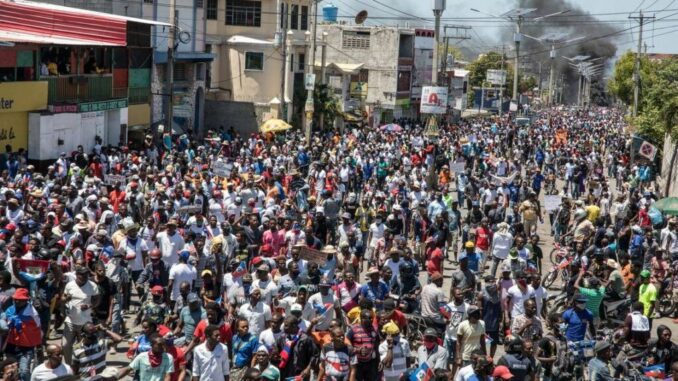Haitian government collapsing – U.S. involved in Moïse assassination?
Conditions for most people in Haiti are dire. While the country has significant economic resources, the wages of Haitian workers are the lowest in the Western Hemisphere, the result of intense exploitation. Estimates from the U.N. are that 20% of Haitians live below the absolute poverty line of $1.23 a day and that 4.3 million Haitians don’t get enough to eat — particularly women, children and adolescents. Less than 1% of Haiti’s gross domestic product is spent on health or education.

Protest in Port au Prince demands then-President Jovenel Moïse step down and elections be held, March 28, 2021.
A powerful Aug. 14 earthquake in southwest Haiti followed by a tropical storm two days later killed 2,248 people and left thousands of homes, businesses and roads badly damaged. In this area, 18% of women and 12% of men are homeless, while 53% of women and 56% of men sleep next to a damaged house. (Rapid Gender Analysis in Haiti: Impacts of the 2021 Earthquake, reliefweb.int)
Conditions in Haiti are so dangerous and miserable that in May 2021 the Biden Administration extended Temporary Protective Status for Haitians already residing in the United States.
But since September 2021, Immigration and Customs Enforcement has been deporting Haitians detained trying to cross the border into Texas. Generally there is at least one planeload and sometimes as many as seven planeloads of people sent back to Haiti every day. Meanwhile, two large boatloads of Haitians have been reported landing in the Florida Keys during the last weeks of December 2021.
The total number of ICE deportees, which certainly are a burden on Haiti’s increasingly stressed economy, has not been announced but is likely to be well over 15,000 people.
Economic catastrophe, political instability
Colonialism and imperialism have stressed Haiti’s economy since 1804 — that year the enslaved people of Haiti declared the country’s independence from France. The French enslavers demanded compensation for their “lost property,” a debt in the millions not paid off until 1947. The imperialist U.S. imposed its first-ever economic and diplomatic blockade on another country by sanctioning Haiti after the 1804 revolution and did not recognize Haiti as a sovereign, independent nation until 1862.
Now extreme political instability in Haiti is intensifying its economic catastrophe.
Interim Prime Minister Ariel Henry went to Gonaïves to celebrate the 218th anniversary of Haiti’s independence Jan. 1. As Henry left the cathedral ceremony, his bodyguards came under sustained, heavy gunfire from an armed group and he was forced to flee.
Years of corruption and mismanagement by Haitian governments dominated by the U.S. — with reliance on foreign nongovernmental organizations (NGOs) to provide basic services like health care, education, sanitation and emergency services during disasters — have left enormous voids in Haiti’s social infrastructure.
Autonomous armed popular organizations have emerged to partially fill these voids. Sometimes these organizations are called gangs, especially by the bourgeois press in Haiti, the United States and France. A more neutral term is armed groups.
Some of these armed groups are indeed criminal, like the “400 Mawozo,” which kidnapped 17 North Americans in October 2021 and demanded a ransom of $17 million. Anti-crime armed groups — an outgrowth of the “vigilance brigades” formed after the overthrow of U.S.-backed dictator “Papa Doc” Duvalier — do exist and confront these criminal groups, which often have close ties to the police and big bourgeois interests.
Bombshell from bourgeois press
The New York Times dropped a Jan. 10 “bunker buster” on Interim Prime Minister Henry, who left his career as a neurosurgeon to enter politics as a leader of the Democratic Convergence Movement. The DCM was part of the U.S.-orchestrated campaign to overthrow President Jean-Bertrand Aristide in 2004.
Henry took on his current role July 7, 2021, the day President Jovenel Moïse was assassinated.
The Times claimed: “New evidence suggests the man who took over from Haiti’s murdered president had close links to a prime suspect in the assassination — and that the two stayed in contact even after the crime.”
Le Monde, a major bourgeois newspaper in France, published a similar article on the same day. The Times made its article available in French; and Le Monde made it available in English — a clear strategy to ensure the articles had the widest impact possible.
Many of the suspects in the assassination of President Moïse were trained by the U.S. military or have connections to the U.S. Drug Enforcement Administration. While the Haitian authorities have opened an investigation into Moïse’s murder, the U.S. has opened its own “investigation” in federal court in Florida.
Haitians are speculating on Twitter that the U.S. opened up its investigation of the assassination so the U.S. can bury its involvement.

